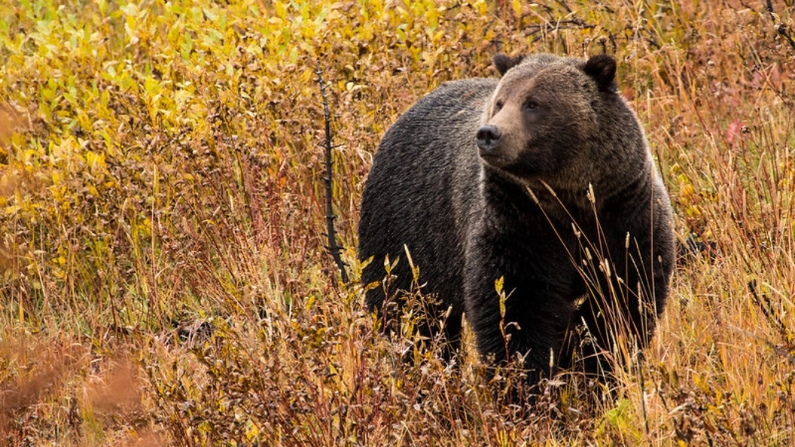Fifteen environmental groups are urging the federal government to adapt how it manages grizzly bears in the Mountain West.
The call comes in a year when about 70 grizzly bears in the Greater Yellowstone Ecosystem have died, largely due to human causes, such as car crashes.
On Wednesday, groups including Earthjustice and the Center for Biological Diversity petitioned the U.S. Fish and Wildlife Service to revise its grizzly recovery plan to better protect the animals.
The effort comes as the Fish and Wildlife Service decides whether it will keep the bears on the endangered species list.

Wyoming, Idaho and Montana have asked the agency to delist them, arguing they’ve recovered — at least population-wise.
But Christopher Servheen disagrees. He wrote the U.S. Fish & Wildlife Service’s current grizzly recovery plan in the ‘90s, as well as a new plan he wants the agency to adopt.
“Most people think of grizzly bears as super powerful,” Servheen said in a press briefing. “[But] they’re really vulnerable, and they’re vulnerable to the decisions we make.”
Servheen and other environmental advocates said the about 2,000 bears in five distinct “islands” in the region haven’t fully recovered since they only occupy a small slice of their former range. They want them to be managed as one “metapopulation.”
This could mean counting the numbers of bears in the areas between those islands each year and looking at their causes of death. It could also mean working with livestock producers to reduce conflicts with the animals.
“We try to minimize the deaths of bears in the connecting areas so that they could move naturally on their own, reoccupy places,” Servheen said.
He added that the goal should be bears moving organically from ecosystem to ecosystem, rather than being trucked there in pickups by state agencies. Two bears were transported this way from Montana to Wyoming earlier this year.
A federal judge ruled last week that the Fish and Wildlife Service has until Jan. 20 to make its decision on whether or not to remove endangered species protections for the bears.
Wyoming Gov. Mark Gordon welcomed this ruling, saying the Fish and Wildlife Service has missed several deadlines to make this decision.
“With the bear recovered, it is long past time for [Greater Yellowstone Ecosystem] grizzly bear management to be entrusted to the states,” Gordon said in a press release. “The State of Wyoming has proven its ability to manage the bear and ensure the viability and protection of this remarkable species.”
Wyoming officials have said they plan to open up grizzly bear hunting if the species is delisted. Advocates say Wyoming and other states must change course and adopt measures that better foster grizzly recovery.
This story was produced by the Mountain West News Bureau, a collaboration between Wyoming Public Media, Nevada Public Radio, Boise State Public Radio in Idaho, KUNR in Nevada, KUNC in Colorado and KANW in New Mexico, with support from affiliate stations across the region. Funding for the Mountain West News Bureau is provided in part by the Corporation for Public Broadcasting.





